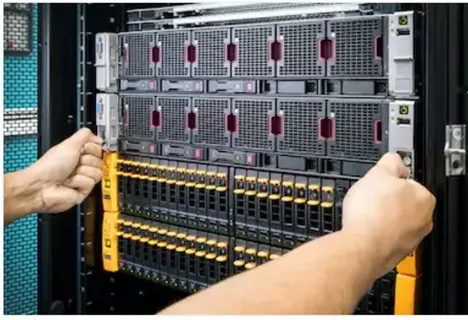NAS for Cybersecurity Firms: Storing and Analyzing Threat Data

In the fast-paced world of cybersecurity, where the battle against threats is constant and evolving, the efficient management and analysis of threat data are critical. Network Attached Storage (NAS) systems have emerged as a powerful solution for cybersecurity firms, providing a reliable platform for storing and analyzing large volumes of threat data. This article explores the various ways in which NAS supports cybersecurity firms in their quest to safeguard digital environments.
Centralized Storage for Diverse Threat Data
Cybersecurity firms deal with a diverse array of threat data, including logs, network traffic, malware samples, and incident reports. NAS systems offer a centralized storage solution that simplifies the management of this data. By consolidating all threat-related information into a single, easily accessible repository, NAS systems facilitate more effective data management.
For instance, incident response teams can store detailed logs and evidence collected during investigations on a NAS device. This centralized approach ensures that all relevant data is organized and readily available for analysis, reducing the time spent searching through disparate sources and improving overall efficiency.
Enhanced Data Analysis Capabilities
The ability to analyze threat data is crucial for detecting, understanding, and mitigating cybersecurity threats. NAS systems enhance data analysis capabilities by providing a high-performance storage solution that supports complex querying and data processing tasks. Advanced NAS devices come equipped with powerful hardware and software features that optimize data access speeds and processing capabilities.
Cybersecurity firms often use specialized tools and software for threat analysis, including security information and event management (SIEM) systems and intrusion detection systems (IDS). NAS systems can be integrated with these tools to streamline the analysis process. By ensuring that threat data is stored in a format that is easily accessible and compatible with analytical tools, NAS systems enable more efficient and accurate threat detection and response.
Secure Data Storage and Protection
Data security is a top priority for cybersecurity firms, given the sensitive nature of the information they handle. NAS systems offer robust security features to protect threat data from unauthorized access and potential breaches. Access control mechanisms allow administrators to define permissions for different users and groups, ensuring that only authorized personnel can view or modify sensitive data.
Encryption is another critical security feature of NAS devices. Data can be encrypted both at rest and in transit, safeguarding it from potential threats. This encryption ensures that even if physical access to the NAS device is compromised, the data remains protected. Additionally, NAS systems often include features such as audit logs and activity monitoring, which provide an additional layer of security by tracking access and changes to stored data.
Scalability to Meet Growing Data Demands
The volume of threat data generated by cybersecurity activities can be substantial and continuously growing. NAS systems offer scalable solutions that can accommodate increasing data volumes without compromising performance. Scalability in NAS systems can be achieved through both vertical and horizontal expansion.
Vertical scalability involves adding more storage capacity to an existing NAS unit, while horizontal scalability allows for the integration of additional NAS devices into a unified network. This flexibility enables cybersecurity firms to expand their storage infrastructure in line with their growing data needs, ensuring that they can handle large datasets efficiently.
Efficient Data Backup and Recovery
Data backup and recovery are essential aspects of data management for cybersecurity firms. NAS systems provide reliable backup solutions to ensure that threat data is preserved and can be quickly recovered in the event of data loss or corruption. Regular backups can be scheduled to create copies of important data, reducing the risk of data loss due to hardware failure, accidental deletion, or other unforeseen issues.
In the event of data loss or corruption, NAS systems offer efficient recovery options that minimize downtime and disruption. By maintaining up-to-date backups and providing easy access to backup data, NAS systems help cybersecurity firms maintain operational continuity and ensure that critical threat data is not lost.
Integration with Security Tools and Platforms
Cybersecurity firms use a variety of tools and platforms for threat detection, analysis, and response. NAS systems can integrate seamlessly with these tools, enhancing the overall efficiency of data management and analysis. Integration with security information and event management (SIEM) systems, for example, allows for the centralized collection and analysis of security events and logs.
Additionally, NAS systems can be configured to work with other security platforms, such as intrusion prevention systems (IPS) and malware analysis tools. This integration ensures that threat data is stored in a format that is compatible with these tools, facilitating more effective analysis and response.
Cost-Effective Solution for Data Management
Budget considerations are important for cybersecurity firms, and NAS systems offer a cost-effective solution for managing large volumes of threat data. Compared to traditional storage solutions or more complex IT infrastructures, NAS systems provide a more affordable and efficient way to store and analyze data.
The cost-effectiveness of NAS systems is particularly advantageous for cybersecurity firms with limited budgets. By consolidating data storage and management into a single solution, NAS systems help reduce expenses related to multiple storage solutions and IT maintenance.
Conclusion
Network Attached Storage (NAS) systems play a crucial role in supporting cybersecurity firms by providing a centralized, secure, and scalable platform for storing and analyzing threat data. With enhanced data analysis capabilities, robust security features, and efficient backup and recovery options, NAS systems address the unique needs of cybersecurity firms. By integrating seamlessly with existing security tools and offering a cost-effective solution, NAS systems help cybersecurity firms manage and protect their critical threat data, ultimately strengthening their ability to safeguard digital environments.

